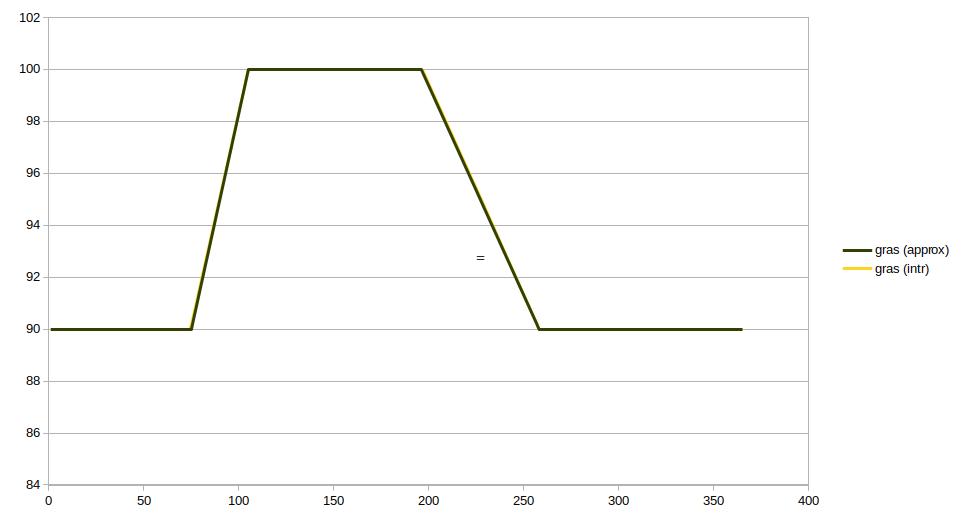Water evaporation factor (Water Overlay): Difference between revisions
Jump to navigation
Jump to search
No edit summary |
No edit summary |
||
| (47 intermediate revisions by 6 users not shown) | |||
| Line 1: | Line 1: | ||
{{Overlay | {{Building attributes | ||
| <onlyinclude> | |||
{{Building attributes|type=row|group=Water Overlay | |||
|attribute=WATER_EVAPORATION_FACTOR | |attribute=WATER_EVAPORATION_FACTOR | ||
|unit=factor | |unit=factor | ||
|functionvalue=Water evaporation | |functionvalue=Water evaporation | ||
|description= | |description=Factor indicating how much a [[building]] with a crop, tree or plant [[function]] facilitates [[Ground evaporation formula (Water Overlay)|evapotranspiration]]. This factor is multiplied with the [[weather (Water Overlay)|weather]]'s evaporation rate at a particular time in the simulation. | ||
|icon= | |icon=waterwizard_icon_evaporation_factor.png | ||
|range=0 to {{halfmaxvalue}} | |||
}} </onlyinclude> | |||
}} | }} | ||
Buildings with a root depth are known as crops and foliage. | |||
Crops and foliage can draw water from the [[Ground model (Water Overlay)|ground]], allowing it to [[Ground evaporation formula (Water Overlay)|evaporate]]. This behaves in the same way as [[terrain]] which is configured as [[Terrain water evaporation factor (Water Overlay)|plants]]. | |||
= | {{article end | ||
* When a | |notes= | ||
[[File:Seasonal_evap_grass.jpg|thumb|right|Varying [[Water evaporation factor (Water Overlay)|evaporation factor]] of grass, depending on the [[Season formula (Water Overlay)|time of year]]]] | |||
* For crops and foliage to evaporate water, both the [[Root depth m (Water Overlay)|ROOT_DEPTH_M]] and the WATER_EVAPORATION_FACTOR must be appropriately configured. | |||
* When a Building is present in any given location, its values for ground evaporation will overrule any values set by [[Hydrological attributes of terrains (Water Overlay)|terrain]] in the same location. To model ground evaporation without a Building, set these attributes on the applicable terrain type instead. | |||
* For Buildings such as trees, the value is set appropriately for a polygon representing an individual tree. If a single polygon is generated for an entire forest, or otherwise represents multiple trees, the [[how to modify evaporation factor from trees to forests|evaporation factor should be modified]]. This is not an issue for fully-covering flora such as grass. | |||
* The groundwater level reduction is inversely proportional to the [[terrain water storage percentage (Water Overlay)|WATER_STORAGE_PERCENTAGE]] of the ground terrain in the same location, as the Building of a given volume of water to the groundwater level increases when the capacity for water storage in the ground layer decreases. | |||
* When a [[Building]] has a [[Water evaporation (Function Value)|WATER_EVAPORATION_FACTOR]] of 0, the amount of evaporation which takes place in that location is 0. | |||
* Can be configured as a [[Season formula (Water Overlay)|seasonal factor]], represented by an array of four values, one for each [[Season formula (Water Overlay)|growth season]]. This allows for more evaporation during a crops growth season and less during the winter. | |||
|howtos= | |||
* [[How to add and remove an Attribute]] | |||
* [[How to modify evaporation factor from trees to forests]] | |||
|seealso= | |||
* [[Water evaporation (Function Value)]] | |||
* [[Terrain water evaporation factor (Water Overlay)]] | |||
* [[Evaporation m (Water Overlay)]] | |||
* [[Surface water evaporation factor (Water Overlay)]] | |||
* [[Ground evaporation formula (Water Overlay)]] | |||
* [[Groundwater level formula (Water Overlay)]] | |||
* [[Ground model (Water Overlay)]] | |||
* [[Evaporation model (Water Overlay)]] | |||
}} | |||
{{ | {{WaterOverlay hydrological building attribute nav}} | ||
Latest revision as of 14:47, 28 February 2024
| Icon | Attribute | Unit | Range | Description |
|---|---|---|---|---|
| |
WATER_EVAPORATION_FACTOR | factor | 0 to 65519 | Factor indicating how much a building with a crop, tree or plant function facilitates evapotranspiration. This factor is multiplied with the weather's evaporation rate at a particular time in the simulation. |
Buildings with a root depth are known as crops and foliage.
Crops and foliage can draw water from the ground, allowing it to evaporate. This behaves in the same way as terrain which is configured as plants.
Notes
- For crops and foliage to evaporate water, both the ROOT_DEPTH_M and the WATER_EVAPORATION_FACTOR must be appropriately configured.
- When a Building is present in any given location, its values for ground evaporation will overrule any values set by terrain in the same location. To model ground evaporation without a Building, set these attributes on the applicable terrain type instead.
- For Buildings such as trees, the value is set appropriately for a polygon representing an individual tree. If a single polygon is generated for an entire forest, or otherwise represents multiple trees, the evaporation factor should be modified. This is not an issue for fully-covering flora such as grass.
- The groundwater level reduction is inversely proportional to the WATER_STORAGE_PERCENTAGE of the ground terrain in the same location, as the Building of a given volume of water to the groundwater level increases when the capacity for water storage in the ground layer decreases.
- When a Building has a WATER_EVAPORATION_FACTOR of 0, the amount of evaporation which takes place in that location is 0.
- Can be configured as a seasonal factor, represented by an array of four values, one for each growth season. This allows for more evaporation during a crops growth season and less during the winter.
How-to's
See also
- Water evaporation (Function Value)
- Terrain water evaporation factor (Water Overlay)
- Evaporation m (Water Overlay)
- Surface water evaporation factor (Water Overlay)
- Ground evaporation formula (Water Overlay)
- Groundwater level formula (Water Overlay)
- Ground model (Water Overlay)
- Evaporation model (Water Overlay)





